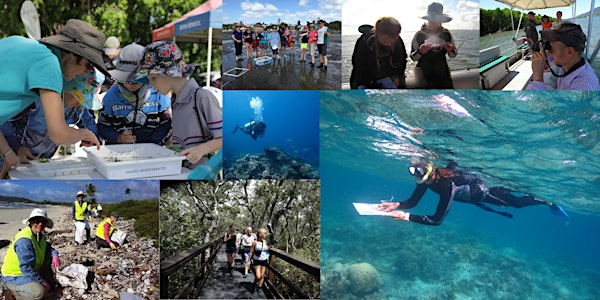
Open Science and Society: Citizen Science Addressing National and International Priorities
Date and time
Location
CSIRO Discovery Centre
Building 101, Clunies Ross Street Black Mountain Canberra, ACT 2601 AustraliaDescription
Open Science and Society: Citizen Science Addressing National and International Priorities
Many scientific institutions and governmental organizations are expanding efforts to enable public contributions to scientific research and monitoring. Citizens are now contributing to classifying galaxies, collecting environmental data, mapping broadband access, using online games to map the structure of an AIDS-related enzyme, and using mobile phones to help authorities in the aftermath of disasters.
Citizen Science is developing rapidly as a movement of significant scope and impact across the world. Professional associations have formed in Australia and elsewhere to advance the science of citizen science, sharing standards and best practices for data quality assurance and integration of citizen science data with official data sources. In the United States, the scientific impacts of citizen science have been recognized by 60 federal agencies and organizations, which coordinate or support more than 400 citizen science projects. The European Commission is expanding its support for multi-national Citizen Observatories programmes. The United Nations now sees citizen science as a key mechanism to help achieve Sustainable Development Goals.
As citizen science continues to grow in Australia, we have an opportunity to align citizen science initiatives with the national strategic science and research priorities, and to leverage the convergence of citizen science with new computational approaches like big data and mobile health.
Join us for an open forum to explore the achievements and opportunities offered by citizen science at national and global scales. This forum will offer a unique opportunity to talk with experts from Europe and the United States who will share their experiences and strategies for building successful partnerships between government, academia and the public to advance citizen science for society.
Please register by 7th February.
All good wishes,
Jenn Loder, Australian Citizen Science Association (ACSA) Management Committee
Libby Hepburn, Atlas of Life in the Coastal Wilderness
Extension opportunities:
In addition to the morning forum, Martin Brocklehurst, Dr Amy Kaminsky, and Dr. Lea Shanley are available in the afternoon for small group or one-on-one meetings. Martin Brocklehurst also can make some time available for meetings in Sydney from 13th to 16th February. If you have an interest in a meeting with these experts please contact:
-
Libby Hepburn libby@atlasoflife.org.au; m: 0458 798 990
-
Jenn Loder info@reefcitizenscience.org; m: 0402 284 681
Panellists will include:
Dr. Amy Kaminski (US) serves as program executive for prizes and challenges at the National Aeronautics and Space Administration (NASA) Headquarters in Washington, DC, where she develops strategies to expand the space agency’s use of open innovation methods in pursuit of its mission. In her prior role as senior policy advisor in NASA’s Office of the Chief Scientist, she led an initiative to support NASA’s involvement of citizens as contributors to its research activities. Kaminski also has held positions at the U.S. Office of Management and Budget and U.S. Federal Aviation Administration. Kaminski holds a Ph.D. in science and technology studies from Virginia Tech, a master’s degree in science, technology, and public policy from The George Washington University, and a bachelor’s degree in earth and planetary sciences from Cornell University.
Martin Brocklehurst (EU) is a founding instigator of the European Citizen Science Association and the Global Mosquito Alert Consortium, working with UNEP and Citizen Science Associations around the world. For 7 years Martin has taken on environmental advisory roles for a wide range of organisations including NGO’s, Public Sector Regulators, Trade Bodies and the UK Parliamentary Audit Committee. For 13 years, he was a senior public-sector regulator, in developing and delivering UK Environmental Regulations, pioneering new approaches to regulation. For 14 years, he was a senior health safety and environmental manager in business recognised for delivering outstanding performance for multi-national oil companies. Independent Environmental Consultants (2011-18), Executive Manager UK Environment Agency (1998-2011), Senior HSE Manager Gulf Oil, Chevron and BP (1984-1998). Professional member of CIWM, the Energy Institute, the Landscape Institute, the British Ecological Society and a Fellow of the RSA.
Dr. Lea Shanley (US) is co-Executive Director of the South Big Data Innovation Hub at the University of North Carolina-Chapel Hill, one of four Hubs sponsored by the US National Science Foundation. The Big Data Innovation Hubs catalyze public-private partnerships to apply data science and analytics to scientific and societal challenges. Prior to this, Dr. Shanley served as a Presidential Innovation Fellow under the Obama Administration, working with NASA HQ to design and guide open science and research strategies for Earth and planetary science. As founder and former co-Chair of the Federal Crowdsourcing and Citizen Science Community of Practice (CCS), Dr. Shanley worked closely with the White House Office of Science and Technology Policy to shape the White House Memorandum on Crowdsourcing and Citizen Science, the citizen science section of the President’s Strategy for American Innovation, and the Crowdsourcing and Citizen Science Act (Sec. 402 of the American Innovation Competitiveness Act), among other policies, and also to mobilize federal staff to build and launch CitizenScience.gov. Previously, Shanley directed the Woodrow Wilson Center’s Commons Lab, and served as a Fellow at the National Academies of Sciences, and as an American Association for the Advancement of Science (AAAS) Congressional Science Fellow in the US Senate. She holds a PhD in Environment and Resources, with a focus on geographic information science and remote sensing, from the University of Wisconsin-Madison. Her bachelors is in Physics from Florida State University.
This forum is organised by the Australian Citizen Science Association and the Atlas of Life, with speakers from the NSF South Big Data Innovation Hub, NASA and the European Citizen Science Association. Kindly hosted by CSIRO.

Organised by
The Australian Citizen Science Association (ACSA) was formed in 2015 to advance citizen science through the sharing of knowledge, collaboration, capacity building and advocacy. ACSA is a member-based community that supports, informs and develops citizen science.